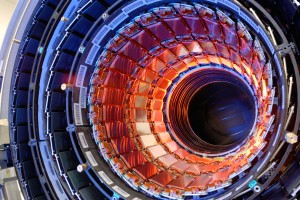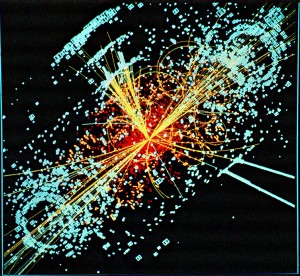Could 2012 be the Year of the ‘God Particle’?
The Large Hadron Collider (LHC) in Geneva, Switzerland is the world’s largest and highest energy particle accelerator. It’s construction was an arduous process, beginning in 1998 and taking 10 years to complete. The collider lies 600 feet beneath the French and Swiss border, and has a circumference of 17 miles. The LHC was a collaborative effort, using the minds of over 10,000 scientists and engineers from over 100 countries!
The purpose of the multi-billion dollar project was to allow physicists to potentially answer some of the most fundamental, unanswered questions known to man. Scientists hope this tool will answer questions about the structure of space and time, and help us to grasp the underlying concepts behind some of the deepest laws of nature.
Specifically, scientists are hunting for what is called the Higgs Boson particle, commonly referred to as the ‘God particle’. The Higgs Boson at this point is purely hypothetical, but physicists believe it exists, and played a vital role in the creation of the universe.
Those involved in the project believe that the Higgs Boson is the agent that made everything in the universe possible: the stars, the planets and in turn, life. They believe this hidden particle gives the building blocks of the universe their property of mass. Physicists believe that without the ‘God particle’, none of these celestial bodies would have been able to form.
Scientists are testing this theory by blasting two beams of energy at each other within the 17 mile loop that is the LHC. The result is a particle collision that actually recreates the conditions that were present in the universe just fractions of a second after the big bang supposedly occurred almost 14 billion years ago.
This week, scientists announced that they would increase the machine’s power by 14% for particle collisions. This seemingly miniscule increase will provide scientists with three times more information from their tens of millions of daily collisions. The upgrade is intended to help scientists begin to understand new age concepts such as dark matter, dark energy and parallel universes.
While nothing has been confirmed yet, scientists say they may be tantalizingly close to reaching their conclusion. The LHC is only operated seasonally, and later this year is due to be shut down for upgrades for nearly two years!
For those that have been following this project since it’s inception, it has been quite a tumultuous ride. In addition to the seasonal limitations, the machine has also already undergone multiple delays. A major find is imminent however, says Project Research Director Sergio Bertolucci, “By the time the LHC goes into its first long stop at the end of the year (2012), we will either know that a Higgs particle exists or will have ruled out the existence of a Higgs (as we currently interpret it).”
Update 7/4/12- A huge breakthrough has been made. A new particle has been discovered.
Comments
Tags: CERN, general relativity, God particle, Higgs Boson, Large Hadron Collider, Particle accelerator, particle physics, physics, quantum mechanics, String Theory, Switzerland
Trackback from your site.



Comments (2)
Maven
| #
This whole “God Particle” theory is a little scary, if it indeed exists; and they replicate it, what does that mean? If a universe resulted from this particle at one time, what do they think will result the next time? If it is merely a component in the creation of a universe, how do you determine whether what you have created is in fact what you are intending? Very thought provoking. I wonder who is regulating this project or if the lure a not fully understood discovery is causing those entrusted with world security to discount the potential impact and look the other way. It certainly wouldn’t be the first time world leaders turned their heads effectively saying “it’s not my job, I thought you were keeping an eye on that”.
Reply
Particle Accelerators and You part 3 « angryfacemehave
| #
[...] https://astounde.com/could-2012-be-the-year-of-the-god-particle/ Share this:TwitterFacebookLike this:LikeBe the first to like this post. Categories Uncategorized [...]
Reply